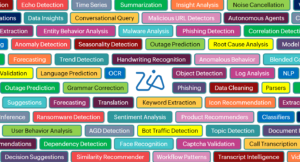 Zoho is renowned for its commitment to providing comprehensive, integrated, and user-friendly software solutions. As a privately held company, Zoho enjoys the freedom to chart its own course, often making unconventional yet impactful decisions. A prime example is their strategy to be the best possible company for their employees by locating offices in areas off the beaten path where the cost of living is lower than in traditional tech hubs. This is why they are gradually reducing the expansion of their Austin office and ramping up hiring at their McAllen, Texas location.
Zoho is renowned for its commitment to providing comprehensive, integrated, and user-friendly software solutions. As a privately held company, Zoho enjoys the freedom to chart its own course, often making unconventional yet impactful decisions. A prime example is their strategy to be the best possible company for their employees by locating offices in areas off the beaten path where the cost of living is lower than in traditional tech hubs. This is why they are gradually reducing the expansion of their Austin office and ramping up hiring at their McAllen, Texas location.
Another reflection of Zoho’s unique approach is their AI strategy. Instead of making a big splash to announce Generative AI capabilities for the sake of press and competition, Zoho has been quietly and efficiently integrating AI into all their products following a well-considered process that started more than five years ago, and described by my colleague Derek Top here. This low-key yet effective approach underscores their dedication to innovation without the need for constant fanfare.
A few months ago, I described Zoho’s dedication to simplicity and affordability in its business philosophy and software solutions. During an analyst event in McAllen, Texas, the Zoho team elaborated on their “smallest best model” approach, which strategically employs various AI models to optimize performance and cost. Narrow models focus on specific tasks like grammar checking, while small, medium, and large models—ranging from 3 to over 50 billion parameters—handle more complex functions such as translation, compliance checks, and advanced content generation.
Last week, at the Zoholics 24 event in Austin, Texas, the Zoho team further explained their approach to AI. The word that kept coming up in these discussions was “contextual.” For Zoho, this term means “focused” or “targeted.” As Raju Vegesna, Chief Evangelist, explained, AI innovation is ultimately about enhancing productivity—the best AI is so seamless that customers don’t even realize it’s there, even while its elevating their performance.
Large Models and Right-Sized Models – Both Have Their Place
Building on this philosophy, Zoho continues to incorporate purposeful AI into all its products. The company offers numerous opportunities for customers to leverage large language models (LLMs) from OpenAI, Anthropic, Cohere, and Vertex.ai. These models can be used for tasks such as generating email responses or summarizing support tickets. However, Zoho also focuses on developing “right-sized” smaller models to enhance productivity and provide deeper insights. All these highly contextual and specialized models are grouped under the Zia branding.
At the event, a chart displayed Zia at the center of many focused capabilities, including summarization, phishing detection, language prediction, keyword extraction, data cleaning, root cause analysis, and more. The key takeaway is that Zia is being trained to automate many critical business functions in a way that is both cost-effective and efficient.
Example Zia Contextual Capabilities

Here are a few examples of how Zia demonstrates the strategic deployment of AI to save time and enhance business processes.
AI in Zoho Desk
Zia can automate tasks within Zoho Desk, the company’s helpdesk application. It analyzes incoming tickets and, based on its training from past tickets, accurately predicts values for fields such as ticket severity, problem types, support tier, and subcategory. Zia’s predictions are checked against an accuracy score, and if they pass, the fields are automatically updated. This triggers a workflow, assigning the tickets to the respective team. This process not only saves time but also reduces the number of improperly handled tickets.
Voice of the Customer
Another example: bringing Voice of the Customer insights to businesses. Zia collects data from Zoho Desk, Zoho Survey, emails, and call transcripts in Zoho CRM. Zia then uses its targeted AI models to generate insights on a wide range of topics, including sentiment, intent, mentions of competitors, and keywords. With this data, businesses can track trends in customer sentiment towards products and services, compare their services to those of competitors, and gain insights on how to improve their offerings.
Ask Zia
Ask Zia leverages the power of language models for natural language understanding and generation, enabling customers to type or speak queries to Ask Zia in their own words—such as “Show me the deals closed this month by stage”—and receive answers in the form of data-filled graphs and charts. While this might seem like a fun magic trick, its real value lies in saving time by bringing valuable business insights directly to the user. There’s no need for no-code or low-code tools to write a report from scratch or sift through data fields; simply ask Zia, and the AI will understand the query and generate the relevant charts.
Retrieval Based Augmentation (RAG) for Improved Self-Service
During my visit to the Zia booth at the Zoholics 24 Experience Hall, I overheard a Zoho customer asking about improving their self-service experience to enable customers to search for information based on specific product attributes stored in Zoho CRM. The Zoho team member demonstrated a new, soon-to-be-released feature that uses RAG to enable LLM-supported queries with access to specific data records. This feature could help the customer facilitate a more granular self-service experience, allowing users to ask for products with specific attributes and receive accurate results.
AutoML
Zoho also supports customers with developer skills by offering their AutoML platform, which enables customers to develop and train their own ML models using their own data. AutoML streamlines the resource-intensive and time-consuming tasks related to creating and deploying effective ML models, making machine learning accessible to non-experts by automating the design, creation, and comparison of models. This allows users to leverage machine learning capabilities without needing significant domain knowledge. Use cases for AutoML include recommendation engines, dynamic pricing models, and sales forecasting.
Zoho’s Commitment to Enhancing Productivity with Contextual AI
Zoho is dedicated to leveraging AI to boost productivity, emphasizing “contextual” AI that is both targeted and efficient. The company develops “right-sized” smaller models under the Zia branding, designed to automate critical business functions in a cost-effective and efficient manner.
Examples of Zia’s applications, such as automating tasks in Zoho Desk and generating business insights via Ask Zia, showcase how AI can streamline business processes and save time.
Zoho is equally committed to privacy. The company ensures customer data is not monetized or shared with third parties and employs advanced strategies for data anonymization and encryption.
Zoho’s focus on secure, contextual AI ensures their solutions effectively address complex business needs while remaining accessible and user-friendly. This approach reinforces their foundational principles of simplicity and affordability.
Categories: Articles

 NiCE Interactions 2025: Agentic AI, Better Data, and a Whole Lot of Partnership
NiCE Interactions 2025: Agentic AI, Better Data, and a Whole Lot of Partnership  Getting It Right: What AI Agents Actually Mean for Customer Support (Webinar)
Getting It Right: What AI Agents Actually Mean for Customer Support (Webinar)  Beyond the Basics: How AI Is Transforming B2B Sales at TP
Beyond the Basics: How AI Is Transforming B2B Sales at TP  Five9 Launches Agentic CX: Toward AI Agents That Reason and Act
Five9 Launches Agentic CX: Toward AI Agents That Reason and Act